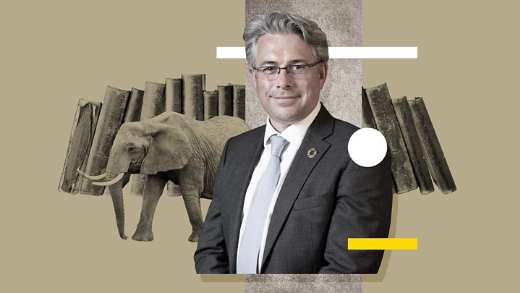Investing in the climate transition
We believe that the risks and opportunities associated with climate change demand urgent action, as limiting its impacts is imperative not only for protecting the environment but also for ensuring long-term economic growth and stability. Addressing climate change by transitioning to a low-carbon economy can mitigate systematic risks, unlock new opportunities and create more resilient markets. Companies that effectively manage their impact on climate and adapt to these challenges are better positioned to thrive in this evolving landscape, presenting an opportunity to deliver sustainable value over the long term.
The Aviva Investors Global Climate Credit Fund is an actively managed strategy focused on global investment-grade bonds. It aims to outperform the Bloomberg Global Aggregate Corporate Index by investing in companies that are effectively addressing climate change and aligning with a net zero emissions pathway by 2050.
The Fund targets bonds from two types of companies:
Solutions: Companies providing goods and services that help mitigate and adapt to climate change.
Operations: Companies adjusting their business models to be resilient in a warmer climate and adaptable to a low-carbon economy.
The Fund also invests in:
Green, Social, and Sustainability Bonds: Bonds funding projects with positive environmental, social, or sustainability impacts.
Sustainability-Linked Bonds: Bonds tied to achieving key performance indicators that promote positive environmental, social, or sustainability outcomes.
Generate income and long-term capital growth
Alignment with a net-zero emissions pathway by 2050
Our approach
We seek to identify the potential winners from the transition across a broad range of sectors. First, we apply our firm-wide baseline exclusions policy and Paris-Aligned Benchmark (PAB) exclusions. We then invest in debt securities of companies either mitigating or adapting to climate change, or companies aligning their operations to be resilient in a low-carbon economy. Furthermore, we leverage our scale and influence and engage with portfolio companies to accelerate progress. We believe this approach can lead to the following investor benefits: profitable growth and resilience across market cycles while seeking to support the climate transition.
Additional focus on Operational Leaders
All sectors of the economy will be impacted by climate change, hence we don’t just invest in ‘Solutions’ companies whose products and services aim to mitigate or adapt to climate change, we go beyond that to also invest in ‘Operations’ companies that are aligning their business models to be resilient in a warmer climate and adaptable to a low-carbon economy. This can help maximise the strategy’s potential to deliver consistent, long-term outperformance as part of a core investment grade allocation.
Optimised portfolio construction
Viewed as an independent source of persistent alpha in both risk-on and risk-off credit markets. Our portfolio construction approach emphasises disciplined risk management and a beta-neutral strategy. This method prioritises downside protection, mitigating aggressive drawdowns and sudden spread blowouts, while targeting high-conviction security and sector opportunities. By focusing on credit alpha rather than beta, the approach enhances excess returns and optimizes risk allocation, making the portfolio resilient to market volatility and macroeconomic uncertainties. Our aim is to achieve consistency designed to perform well across various market conditions, ensuring long-term growth and stability.
Driving positive climate action through our bespoke engagement programme
Our bespoke and structured engagement programme encompasses two main asks of companies in which we invest: adopt science-based targets and provide CDP disclosures – in addition to further tailored asks to improve their climate credentials. Science based targets can provide a clearly defined pathway to reduce greenhouse gas emissions in line with the Paris Agreement and we view CDP disclosure as the most complete source of corporate environmental data in a standardised format.
Climate investment fund
Aviva Investors Global Climate Credit Fund (SICAV)
An actively managed strategy focused on global investment-grade bonds. It invests in companies that are effectively addressing climate change and aligning with a net zero emissions pathway by 2050.
Evidencing how we are progressing against our sustainable outcomes objective
This report looks at the progress the fund has made in 2023, in delivering tangible sustainable outcomes for clients, across the companies invested in as well as through company engagement and macro stewardship.

Bond Voyage: A journey into fixed income
Each month, our freewheeling fixed-income newsletter gathers insights from our high-yield, investment-grade, emerging-market and global sovereign bond teams.

Key risks
For further information on the risks and risk profiles of our funds, please refer to the relevant KIID and Prospectus.
Investment risk and currency risk
The value of an investment and any income from it can go down as well as up and can fluctuate in response to changes in currency and exchange rates. Investors may not get back the original amount invested.
Credit and interest rate risk
Bond values are affected by changes in interest rates and the bond issuer's creditworthiness. Bonds that offer the potential for a higher income typically have a greater risk of default.
Illiquid securities risk
Some investments could be hard to value or to sell at a desired time, or at a price considered to be fair (especially in large quantities), and as a result their prices can be volatile.
Counterparty risk
The Fund could lose money if an entity with which it does business becomes unwilling or is unable to meet its obligations to the Fund.
Derivatives risk
Derivatives are instruments that can be complex and highly volatile, have some degree of unpredictability (especially in unusual market conditions), and can create losses significantly greater than the cost of the derivative itself.
Sustainability risk
The level of sustainability risk may fluctuate depending on which investment opportunities the investment manager identifies. This means that the fund is exposed to sustainability risk which may impact the value of investments over the long term.
Global Climate Credit team

Justine Vroman
Senior Portfolio Manager

Thomas Chinery
Senior Portfolio Manager
Climate change views
-

Decarbonising buildings: Five barriers and how to overcome them
28 Jan 2025
The built environment generates almost two-fifths of global emissions, but decarbonising the sector will require a coordinated effort. We brought together experts across the value chain to discuss shared challenges and solutions.
-

Can credit hold firm in 2025? The outlook for investment grade credit and climate transition
24 Jan 2025
Credit spreads remained largely immune to turbulence in 2024 despite concerns for a reacceleration in inflation, an unprecedented scale of global elections and volatility on economic data and changing rate cut expectations. Where to in 2025?
-

Decarbonising transport: Five key challenges and how to overcome them
26 Nov 2024
Creating sustainable transport solutions is vital to meet net-zero pledges, but progress has been patchy. To encourage mobilisation across value chains, we brought together a range of sector experts to identify key blockers and potential solutions.
-

Building bridges to net zero: Mobilising value chains for decarbonisation
25 Nov 2024
From aviation to heavy industry, achieving net zero requires a collective unlocking of entire ecosystems. This is what our sector roundtables aim to do, by bringing together stakeholders from across the value chain of high-impact sectors.
-

The tipping point for climate finance: Making financial flows consistent with the Paris Agreement
29 Nov 2023
Transition plans, including from governments in response to the Global Stocktake, will be crucial to bring about the shift to a low-emissions, climate-resilient world. Markets need clear implementation signals to align capital with the goals of the Paris Agreement. Our in-depth report calls for the creation of a transition-plan ecosystem connecting all levels of the global economy.
-

Deals delayed and crowded trades…But investors can still find value in infrastructure debt
4 Sep 2023
Private infrastructure debt still offers a broad spectrum of opportunities, but investors face complex challenges. In this Q&A, our infrastructure debt team contemplate the current state of the market and where it goes from here.
-

Tipping points and transformation: Getting on the right side of change
16 Aug 2023
Rapid changes in the global economy could tip some sectors into low-carbon phases faster than incumbents expect, with important investment implications.
-

Charging up: Batteries and the fight against climate change
5 Jan 2023
Batteries are set to play a crucial role in helping to decarbonise the global transport and energy sectors. As capital floods into an industry experiencing exponential growth, we look at the key considerations for investors.
-

Confronting a permacrisis? The intersection between antimicrobial resistance, climate change and biodiversity loss
23 Nov 2022
Will a warmer and less biodiverse world give pathogens new opportunities, and do we have the tools to confront disease? This report discusses the complex intersection of three planetary crises and calls for urgent action to slow resistance to antimicrobial drugs – an obvious public health emergency.
-

The levers of change: A systems approach to reconcile finance with planetary boundaries
13 Sep 2022
Financial services underpin all economic activity, which itself depends on Earth’s natural capital. Resolving their interconnected issues to bring about a just transition will require a holistic, systems-thinking approach.
-

A tragedy of perception: Fixing the ESG blind spots in business, finance and economics
8 Sep 2022
A distorted sense of reality has caused us to disregard sustainability concerns when modelling economies, companies and finance. We can no longer ignore such material issues just because they are too hard to fathom. This is where systems thinking comes in, explains Steve Waygood.
-

Redefining stewardship: Why stakeholder capitalism needs to wake up
31 Aug 2022
Asset managers and other financial institutions have a duty to act in the best interests of their customers and society. Macro stewardship will be crucial to meeting these responsibilities, argues Mark Versey.
-

Know your limits: An interview with Nafeez Ahmed
29 Aug 2022
Warnings that natural systems are close to breaking point are not new – but how will we respond? Combining what we know with existing technologies could offer a remarkable opportunity to rethink our world, as Nafeez Ahmed explains.
-

The burning issue: Avoiding ESG fatigue
25 Aug 2022
How can we face existential problems and stay positive? Abigail Herron contemplates simple steps to protect momentum and avoid burnout.
-

Strategies to change the financial system: An interview with Natalie Mangondo
16 Aug 2022
Can society reform the system that has enabled growth but simultaneously brought the long-term health of the planet into question? UN Climate Change High Level Champions Finance Youth Fellow Natalie Mangondo contemplates choices and change with AIQ.
-

Deep water: Ten threats to marine ecosystems
8 Jun 2022
Our air, weather, food, the health of diverse marine life and millions of jobs all depend on the ocean. But we have not done well as custodians of marine ecosystems. Here, we set out ten ways where human actions threaten the health of an essential environment.
Explore our fixed income range
Need more information?
For further information, please contact our investment sales team.
Note for UK Investors: This Fund is domiciled in Luxembourg and is authorised by the Commission de Surveillance du Secteur Financier (CSSF). The Fund is recognised in the UK under the Overseas Funds Regime but is not a UK-authorised Fund and therefore is not subject to UK sustainable investment labelling disclosure requirements. UK investors should be aware that they can make a complaint about the fund, its management company, or its depositary. However, complaints may not be eligible for resolution by the UK’s Financial Ombudsman Service and any claims for losses related to the management company or depositary will not be covered by the Financial Services Compensation Scheme (FSCS). UK investors should consider seeking their own financial advice before making any decisions to invest and refer to the scheme prospectus for further information.





















